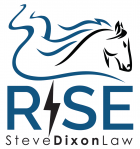I recently attended the Broadway play Hamilton. In that play, King George, III provides comic relief. Following the portrayal of England’s loss in the Revolutionary War, King George takes on somewhat of a third-party neutral roll when commenting on the United States’ actions post-secession from the UK. I often get asked questions about the third-party neutral process, including what the word “arbitration” means. Some people or jurisdictions consider arbitration and mediation to be similar. Although both arbitration and mediation are included under the alternative dispute resolution umbrella in Nevada, an arbitrated case is still one that is litigated in this jurisdiction. Here, an arbitrated case generally includes the appointment of an arbitrator who serves as the trier of fact, or the judge.
Other arenas use also use arbitrators as well. For example, in Major League Baseball, once a player accrues enough “service time,” or playing time in the majors, he can file for salary arbitration. During the first few years of a player’s time in the major leagues, he will generally earn the league minimum for salary, unless he has a whopping endorsement. However, once his service time is sufficient, he can file for arbitration in an attempt to increase his salary based on his performance so far.
The MLB arbitration process includes neutral parties who sit with the player, the player’s agent, and the player’s major league team. The arbitrators hear arguments from both sides about the reasonable value of the player’s salary for the next season. Once the arguments are made, the arbitrators accept either the player’s offer or the teams offer, and both parties move forward with the decision that is binding on both sides regarding the player’s salary.
In Nevada, the arbitration process is governed by rules set forth by the Nevada Supreme Court. In the arbitration program a claimant cannot receive an award in excess of $50,000, exclusive of fees and costs. Thus, if a case has a potential value that cannot exceed $50,000 at any trial, the claim will go forward in the arbitration program.
Similar to MLB, the arbitration program appoints a neutral third-party to be the judge. The “judge” is usually a practicing attorney who has knowledge regarding the type of dispute that was brought in the arbitration program. Appointed arbitrators must have a minimum number of years’ experience as a practicing attorney, and understand discovery and trial rules. The arbitrator is actually given many powers that an appointed or elected judge has in order to make rulings on discovery issues leading up to trial. The arbitrator also becomes the trier of fact at the trial. An arbitration trial is often referred to as an arbitration hearing.
A case will move forward in the arbitration program automatically unless it qualifies for an automatic exemption, or the plaintiff’s attorney seeks to exempt it from the program. The automatic exemptions from the arbitration program include the following:
“class actions, appeals from courts of limited jurisdiction, probate actions, divorce and other domestic relations actions, actions seeking judicial review of administrative decisions, actions concerning title to real estate, actions for declaratory relief, actions governed by the provisions of NRS 41A.003 to 41A.069, inclusive, actions presenting significant issues of public policy, actions in which the parties have agreed in writing to submit the controversy to arbitration or other alternative dispute resolution method prior to the accrual of the cause of action, actions seeking equitable or extraordinary relief, actions that present unusual circumstances that constitute good cause for removal from the program, actions in which any of the parties is incarcerated and actions utilizing mediation pursuant to Subpart C of these rules.” See ADR Rule 3(A).
If the case does not fit within one of these automatic exemptions, then the filing attorney must seek for removal of the case from the arbitration program within 20 days of the defendant filing an Answer to the Complaint. See ADR Rule 5(A). The arbitration commissioner then makes a decision as to whether he or she believes the case merits being exempted from the arbitration program, thus removing the award cap of $50,000.
There are several benefits to having your case proceed in the arbitration program. For one, cases in that program proceed through the system much faster than if a case were to be brought in the regular course of District Court. In the arbitration program, cases are generally heard and decided on by the arbitrator within six to nine months. In District Court, it is not unheard of for a case to take two to three years before it is tried in front of a jury (or a judge).
Other benefits include a more relaxed atmosphere at an arbitration hearing and during the discovery process. However, even though the arbitration process is generally a bit more relaxed, claimants still feel like they have been given their day in Court in front of someone who is vested with even temporary judicial authority.
For easier access, the ADR rules can also be found here, although the Supreme Court’s version is preferable in case changes are made in the future.

